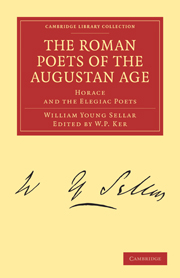CHAPTER III - PROPERTIUS: LIFE AND PERSONAL CHARACTERISTICS
Published online by Cambridge University Press: 07 September 2011
Summary
There is a greater difference of opinion about the literary position of Propertius than about that of any other Roman poet. The place of Lucretius and Virgil, of Horace and Catullus, in the first rank of Latin authors and among the great poets of the world, has been generally conceded. A similar position would have been allowed to Ovid in any century before the present. The rank of Tibullus as a classic of the second order is also undisputed. Propertius, on the other hand, has, within the present generation, emerged from comparative neglect to the place of chief favourite among the elegiac poets. Quintilian informs us that he had, in the ancient Roman world, his admirers who preferred him to Tibullus and Ovid; and the younger Pliny, in speaking of a poet of his day who claimed to be descended from him, writes appreciatively of him. Ovid, a just as well as a generous critic of his contemporaries and predecessors, by the words ‘ignes’ and ‘blandique Propertius oris’ shows his appreciation of the ardour as well as the musical charm of his verse. Martial includes the ‘Cynthia Monobiblos’ among the gift-books for which he wrote inscriptions, and Juvenal mentions Cynthia along with her
cuius
Turbavit nitidos exstinctus passer ocellos
as an instance of the degeneracy of Roman morals from the old Sabellian ideal. Statius also includes him in a common appreciative notice with Philetas and Callimachus, Ovid and Tibullus.
- Type
- Chapter
- Information
- The Roman Poets of the Augustan AgeHorace and the Elegiac Poets, pp. 260 - 292Publisher: Cambridge University PressPrint publication year: 2010First published in: 1892



